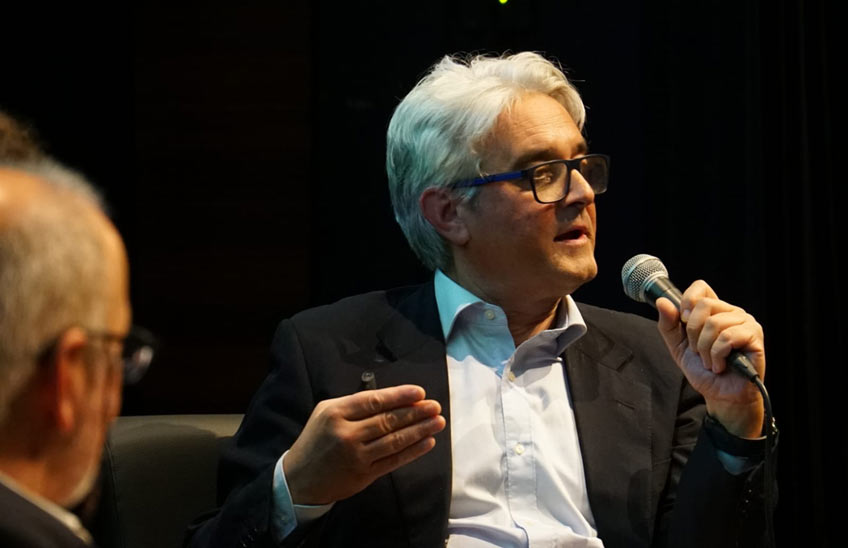Pérez Mediavilla, researcher of Cima, on Alzheimer's disease: "Healthy habits are neuroprotective and favor neurogenesis".
The third session of the "October with Cajal" series, organized by the Science Museum of the University of Navarra, brought together 130 people.

19 | 10 | 2022
130 people participated in the third session of the Cycle "October with Cajal", held last Tuesday, October 18 at Civivox Iturrama. The roundtable dealt with "The brain and its diseases: research in neurosciences" with the participation of Marisol Aymerich (researcher at Cima University of Navarra), Maite Mendioroz (researcher and director of Navarrabiomed) and Alberto Pérez Mediavilla (Associate Dean of the School of Sciences and researcher of Cima). The round table was moderated by Ignacio López-Goñi, director of the Science Museum of the University of Navarra.
The session focused on the neuronal theory developed by Santiago Ramón y Cajal -based on the idea that brain tissue is composed of individual cells- and which would later serve as the basis for modern research on brain diseases such as Parkinson's or Alzheimer's disease.
The discussion began with the intervention of Maite Mendioroz, director of Navarrabiomed, who explained the chronology of Alzheimer's disease and the difficulty of reversing the disease once the first symptoms have appeared. "In neurodegenerative diseases we cannot perform a biopsy during life and we need indirect tests that tell us how the brain is doing". The researcher has pointed out that the work being developed at her laboratory is focused on predicting the disease, from the programs of study in brain tissue, or the employment of the liquid biopsy in order to try to identify in the blood of patients some marker that reflects the pathological brain changes.
Alberto Pérez Mediavilla also focused his intervention on Alzheimer's disease and explained in an informative way the differences between a normal brain and a diseased one. For the scientist "healthy habits are neuroprotective and favor neurogenesis (training of new neurons in the brain)", such as a per diem expenses rich in fish, fruit and vegetables; intellectual activity (can favor the synaptic reservoir) and physical exercise (favors oxygenation, vascularization and glucose uptake, and promotes neuronal differentiation). "When you are young is the time to have those habits because that is going to increase our synaptic reservoir."
On the other hand, Marisol Aymerich, researcher at Cima, has made a historical review of Parkinson's disease - since it was named in 1872 until the era of genomics in the 1990s - and has said that advances in analysis techniques have helped us to understand the disease and improve current therapies. Aymerich says that 90% of Parkinson's cases are sporadic forms (10% would have a genetic component). "By sequencing people with Parkinson's we can discover genes that favor the development of the disease and we have discovered mechanisms that we did not know were important in this disease, such as the immune system or functions of the mitochondria". The doctor emphasized that at Cima they work with animal models and design neuroprotection strategies. "We are working on designing neuroprotection strategies to slow down the disease and it would be an achievement to do so in the initial stages".
The next session of the cycle "October with Cajal" will be on Tuesday, October 25 at 7 pm at the Civivox Iturrama (C / Esquíroz, 24) where they will talk about "Mind and brain". The roundtable will be composed by Javier Bernácer (researcher of the group Mente-cerebro of the University of Navarra) and Carmen Cavada (director of the Chair UAM-Fundación Tatiana Pérez de Guzmán el Bueno en Neurociencias) who will tell us how the brain works and the relationship between the brain and the mind.
"October with Cajal" is a series of sessions organized by the Science Museum of the University of Navarra - in partnership with the Pamplona City Council and the Planetarium -with the aim of disseminating the figure of Santiago Ramón y Cajal, in the year that marks the 170th anniversary of the birth of the Spanish scientist.





